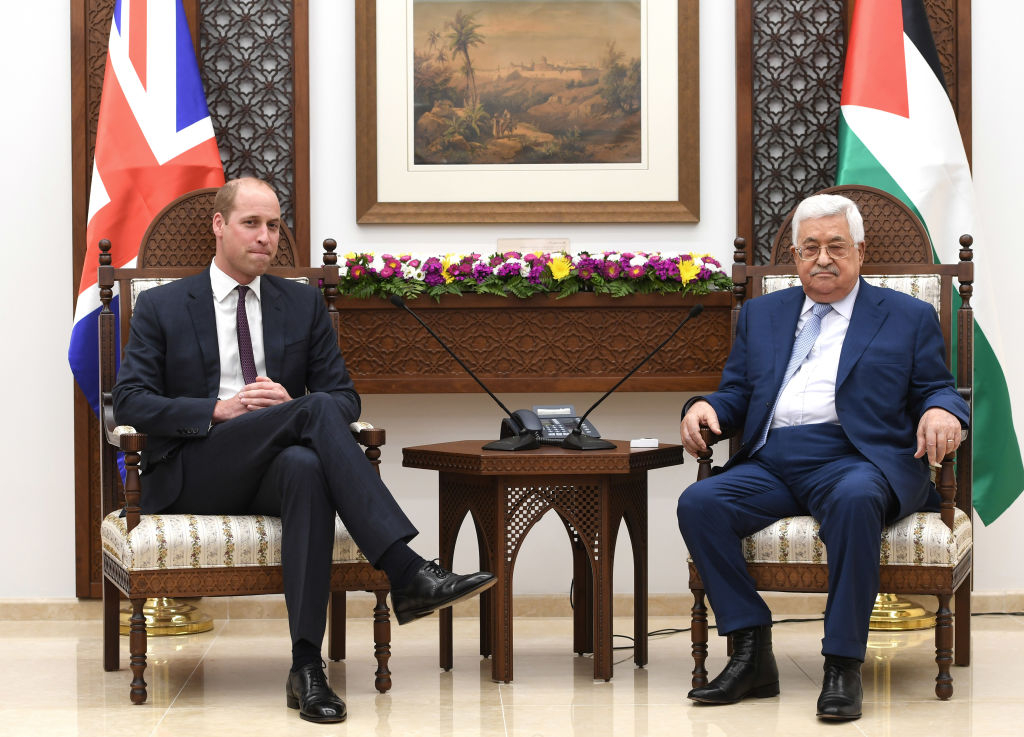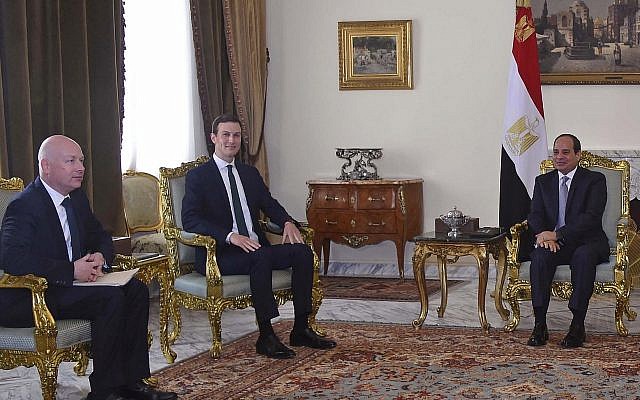Prosperity Through Peace?
"Palestinian Authority President Mahmoud Abbas shared some interesting news with England's Prince William during a meeting in Ramallah on June 27. He informed the royal visitor that the Palestinians are 'serious about reaching peace with Israel.' Abbas also said that the Palestinians were 'committed to combating terrorism'."
"What makes this news interesting is that as Abbas was speaking to Prince William in his Ramallah headquarters, known as the Mukata, the Palestinian government issued a statement praising Palestinian terrorists imprisoned by Israel. The Ramallah-based government also vowed to continue paying salaries to Palestinians convicted of murdering and injuring Jews, defying Israeli and American demands to stop the payments."
"It seems that Abbas and Israel have different views on how terrorism should be combated. Abbas seems to think that paying salaries to convicted terrorists and their families is a good first step in that direction."
"Palestinian prisoners are our national icons and symbols of defending freedom and dignity and confronting oppression and subjugation."
Bassam Tawil, Gatestone Institute, International Policy Council
 |
| Prince William, Duke of Cambridge meets Palestinian Authority President Mahmoud Abbas during an official visit to in Ramallah, on June 27, 2018. (Photo by Joe Giddens - Pool/Getty Images) |
"The world has moved forward while you have been left behind. Don't allow your grandfather's conflict to determine your children's future."
"We will release our peace plan and the Palestinian people will actually like it because it will lead to new opportunities for them to have a much better life."
Jared Kushner, White House senior adviser to the Middle East
 |
| In this Thursday, June 21, 2018 photo, Egyptian President Abdel-Fattah el-Sissi, center, meets with US President Donald Trump’s son-in-law and senior adviser Jared Kushner, second left, and Mideast envoy Jason Greenblatt on the latest stop in a regional tour to discuss a blueprint for an Israeli-Palestinian peace deal, in Cairo, Egypt. (MENA via AP) |
Special U.S. envoy Jared Kushner had an interview published in the leading Palestinian newspaper Al Quds in which he emphasized that the peace process could move ahead as soon as the Palestinian Authority decided to declare that the war with Israel is finished. The Palestinian issues that they place at the core of any negotiations; the return of refugees, a sovereign state that would include East Jerusalem and ending Jewish West Bank settlements should be regarded as negotiating "talking points"; negotiable in other words, not demands.
For one thing the UNHCR unique recognition of Palestinian 'refugees' as representing not only the original Palestinians who fled the geography but all their descendants (original: an estimated 700,000; including later generations: five million-plus) a 'return' that would obviously swamp Israel with an Arab/Muslim population equal to the Jewish presence, minus the one and three-quarter million Arabs who have Israeli citizenship, comprising over 21 percent of the population. 'Return' would spell the end of the Jewish state -- which is the actual goal.
It's one of those "not gonna happen" issues, imperilling Israel's survival. What Kushner speaks of is hopes of a new day dawning, when the younger generation of Palestinians finally understand the check-mate situation that solves nothing which the Palestinian Authority has engineered in long-term aspiration of having Israel disappear. This is the proposed rational against the imposed embittered emotions of anti-Zionism. The hope may be there that young Palestinians in the West Bank and Gaza will tire of the 'resistance' shtick that gets them nowhere and begin to seriously look at a more promising future.
One that, with a peace agreement, Muslims will finally achieve some of their goals, presumably the more modest ones of sovereignty, recognition, an end to conflict and the beginning of prosperity and pride. An opportunity as Kushner states "to leapfrog into the next industrial age" through participation in the ecosystem of "Silicon Valley of the Middle East, Israel". It makes eminently good sense to imagine that young, opportunistic Palestinians would want to take that chance and reap the future.
But to do so, frays the fabric of heritage and culture, defying the imposed PA strictures against 'normalization' with the 'Zionist enemy'.
It would mean the youthful generation separating their interests from their elders, and in the process rejecting the national narrative of 'occupation', 'resistance', and 'martyrdom'. These are the values, after all, that they've grown up with, from cradle to grave as it were. In the cradle and beyond the lullabies whisper hints of martyrdom and the glory and fame achieved by the time the cradle gives way to 'resistance', when martyrdom merits a street named after the heroic action that led to Jewish lives surrendered to vengeance, rage and victimhood.
As ever, the Government of Israel makes overtures, invites cooperation, offers opportunities. Palestinians may regard Jews as oppressors and occupiers as is drummed into their consciousness but they are also more than willing to take employment in Israel and a recent announcement of 7,500 work permits issued to West Bank residents to counter the 20 percent unemployment rate speaks volumes. By no means is this considered a risky security threat since an estimated 100,000 West Bank Palestinians work in Israel as it is, with few untoward incidents arising.
Palestinians' lives are engraved with hardships. International investments in the Palestinian economy never did eventuate in the wake of the second intifada signalling to the international investors that their trust in a serene social environment securing their investments was unsound. The endemic corruption of Palestinian authorities and the bureaucracy is understood and deplored by Palestinians. Amid fears of accusations of collaboration, even Israeli entrepreneurs willing to invest in the West Bank came to nought.
The question is whether practical discourse and determination can prevail over emotional passion of blame, victimhood and rage, to attempt the Trump administration's "peace through prosperity" plan. Where once the Palestinian leaders could count on support from the governments of Saudi Arabia, Egypt, Jordan and the Gulf States, that support has been reduced to statements and nothing more in an atmosphere where majority Sunni states fear the consequences of a rampaging Shiite Iran threatening stability in its conquest bid.
Labels: Conflict, Israel, Palestinians, Peace, Political Realities, Security, United States
0 Comments:
Post a Comment
<< Home